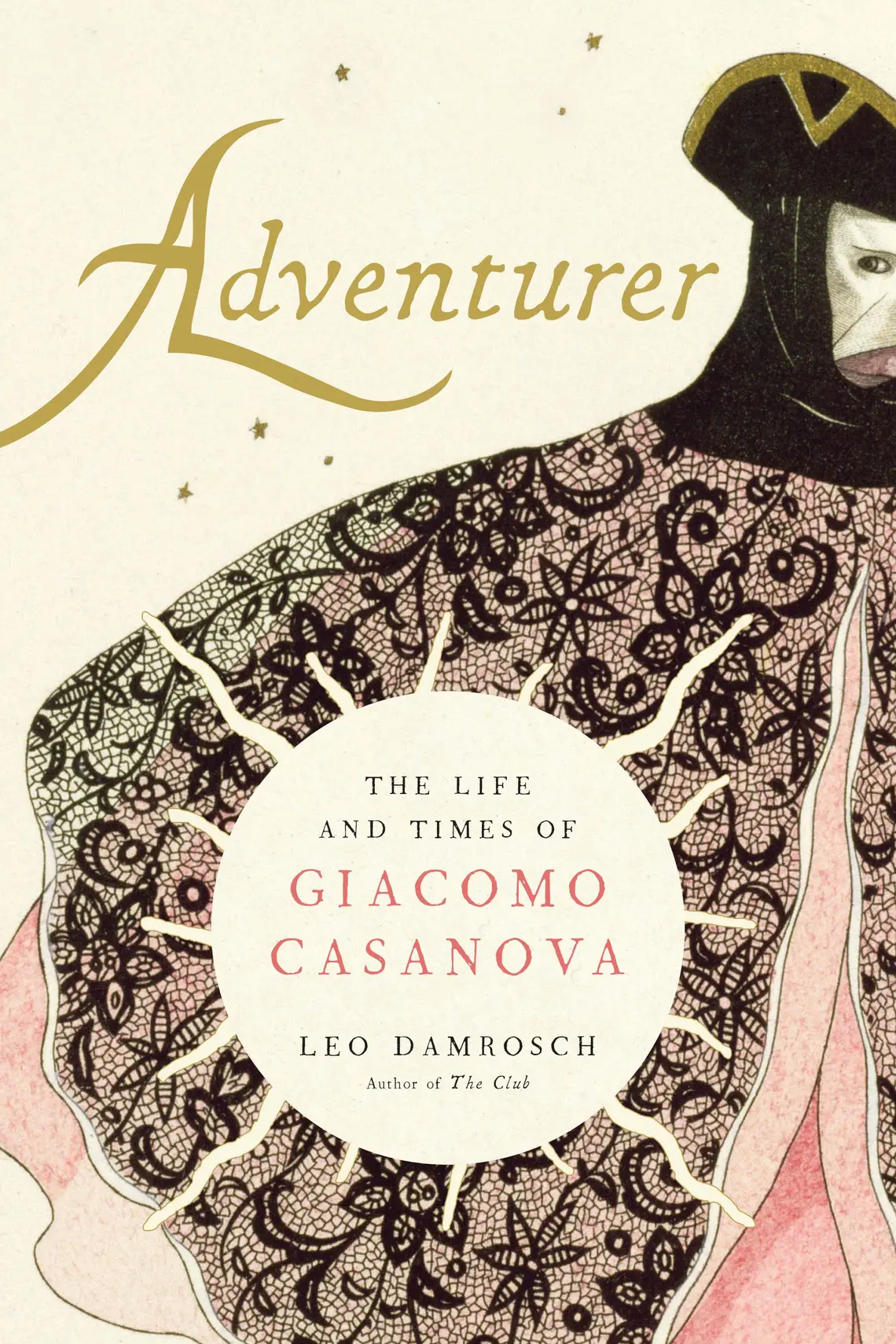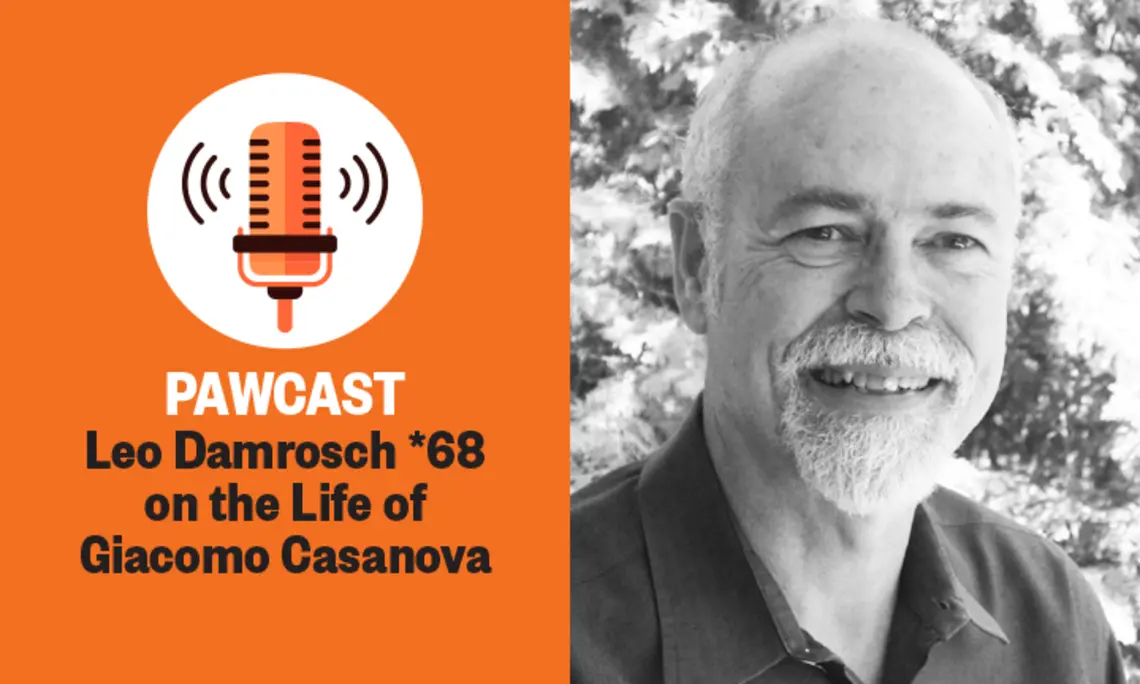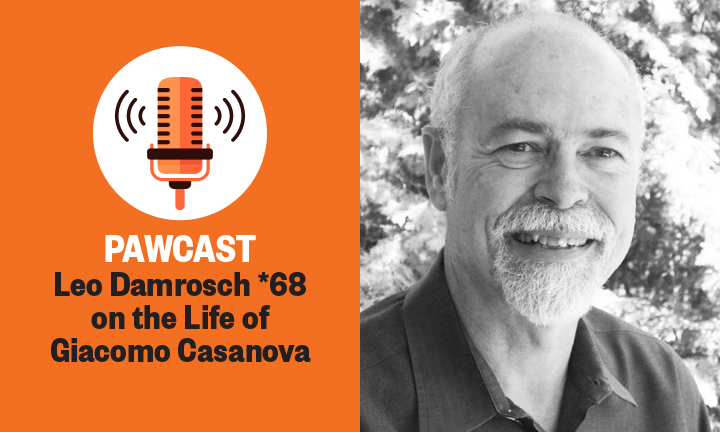

PAWcast: Leo Damrosch *68 on the Life of Giacomo Casanova
‘It is just a whole fascinating multilayered world that he gives us access to’
Listen on Apple Podcasts • Google Podcasts • Spotify • Soundcloud
The name “Casanova” conjures many ideas and images, only some of them true to the brazen libertine who lived in 18th-century Venice. His name is even in the dictionary. Now, Harvard English professor Leo Damrosch *68 has sought to tell the true story in a new biography titled Adventurer: The Life and Times of Giacomo Casanova. Damrosch spoke with PAW about the many escapades, cons, travels, and love affairs that filled Casanova’s life, and about viewing this legendary but flawed figure through a modern lens.
TRANSCRIPT:
Elisabeth H. Daugherty: Leo Damrosch *68 is a Harvard professor of literature, emeritus, who has written biographies of Jonathan Swift, William Blake, and others. In his new book, titled Adventurer, he tackles Giacomo Casanova — the real Casanova, separate from the many fictionalized accounts that his name has inspired over the centuries, and separate from the version he painted of himself in a massive autobiography toward the end of his life. Damrosch spoke with PAW about untangling Casanova’s story and about how the modern biographer should treat a legendary womanizer, spy, con man, diplomat, gambler, novelist, and philosopher more than 200 years after he lived.
EHD: All right, so Professor Damrosch, thank you so much for taking the time to speak with me today.
Leo Damrosch: Thanks for inviting me.
EHD: So why did you decide to write about Casanova?
LD: Well, it happened by chance. I had stopped writing kind of formal academic books and had begun writing biographies for a more general public, which I greatly enjoyed. First one was in fact, on a French speaking writer, Jean-Jacques Rousseau, and in 2009, I happened to have a chance to teach in the Harvard summer program in Venice. And preparing for that I took intensive Italian for a year — I love it. Classes were in English, and when my wife and I spent the summer there, well, like everybody, we fell in love with Venice, fascinating place.
And I wanted to add one Italian figure to my 18th-century culture course that I was giving, and Casanova came to mind. I knew very little about him. And by the time I left, I was thinking one day I would like to write his story. I began reading about him. There are biographies, but in my view, there’s many things they don’t do as well as they should. And eventually the opportunity came and it was a great pleasure to dive into him and his world. And the extraordinary, different milieu that he lived in: Gamblers, con men — not just the famous lover of legend.
EHD: Can you tell me a little bit about how you sourced this? Because you had, I think not every biographer gets this, this massive manuscript that he created — more than 3,000 pages. You say it was the size of an atlas. And he, Casanova, claimed it was all true, but maybe a little altered from what the reality was? How did you—
LD: Yeah. I was grateful to happen upon a remark by Richard Holmes, a biographer I greatly admire, who was saying basically the stories people tell about themselves and think they remember are a kind of truth about themselves. And even if they’re not always literally accurate — Rousseau said that. When he wrote his confessions, he said, I absolutely am trying to tell the complete truth about everything. And some years later he said, you know, I was telling the truth about what I felt while I was writing the confessions, you know, as years and years later. And Casanova was given to telling tall stories and so on, but some of his most extraordinary feats have been in fact commanded by historians. And he did keep notes all the time. A customs inspector in Barcelona was once astonished to open his trunk and find it was two-thirds full of notebooks because he carried them with him everywhere.
And I think he really did want to preserve his life, which is kind of what Rousseau did, not expecting to publish it but simply to relive what he had been in his happier days. So I think it’s not untrustworthy as a record of what he experienced and what life felt like to him.
And the, if I may ramble a little, little longer, the great advantage I had, which no biographer did before me is two massive, wonderful scholarly editions that were produced in France after the original manuscript finally became available in the French national library. Until then all that was known was altered in burglarized forms that a publisher in Germany wouldn’t release the original for. And these wonderful scholars — I mean really deep students, not just of Casanova but his world — annotated everything and, you know, help you to understand what the contexts are. And it was just a gold mine for a biographer.
And in addition, I’ll just say one more thing: People writing in English usually don’t read scholarship in other languages. And in fact, most of the good work on Casanova is in French and Italian — not surprisingly, he wrote in French because that was the universal language in Europe in his day. And there’s just amazing resources, not just factual, but interpretive, you know, really brilliant people trying to figure out what he was and what was going on. So I had all that available. That was the sources.
EHD: Well, and I appreciated that the parts of his biography, where especially he treats some of his affairs with these women, where you said, did it really, was everyone really as happy with the situation as it was? Treating certain pieces of it, I think with a little bit of skepticism — I thought that was really interesting.
LD: Yeah. obviously in this day and age, it’s a particularly important issue to be cautious with. And I was fortunate both my editor at Yale University Press and my wife noticed many pressure points in the original manuscript where I was not really thinking things through or considering how they might strike a reader. But more generally I think he was not insincere in this because he prided himself on not being just a serial seducer. He always thought he fell in love each time. And in a sense, he did, he was smitten. It often didn’t last very long, and it often wasn’t very deep. And when he moved on, usually the woman or the girl involved couldn’t move on. But I, I totally agree with the French critic who said it was essential to his narcissism to think that nobody ever got hurt. And so he needed to believe that all was well that ended well.
But as you know, from the book, I have a whole chapter on the only letters that he somehow kept that didn’t get destroyed by one of his lovers, a young woman in Paris, to whom he was engaged to for three years, avoided ever getting married. She perfectly well knew he must be seeing other women at the same time, but she was in love with him. And the letters are very poignant because she’s deeply intelligent and moving to read. And eventually she just told him it’s over, I’m marrying some other guy, forget it. But those letters give you an insight into what it might have felt like for his partner.
EHD: This struck me as a really interesting time to be looking into this particular character, because we are at an interesting moment, I think in our own culture, we’re only a few years out from the #MeToo movement, right? And here we have this character who — you’re right, he had some very emotional, true affairs. And he also did some really horrible things. I mean, he slept with 12-year-old girls sometimes after paying their parents, he raped a woman while she was sleeping. He slept with his own daughter, right? How did all of that … I don’t know. Did it influence the way that you looked at it? Do you think that he’s going to be — that Casanova is going to be looked at differently than he has been in the past?
LD: Oh, I think he has a bad enough reputation of it as a, as a Don Juan. And he was not the archetypal sort of collector of scores, heartlessly using people and discarding them. I really think he believed he wasn’t, and in the best cases actually did have a kind of mutual sharing. There’s a woman he calls Henriette — he gave everybody almost certainly different names than the real one to protect their identity — a French noble woman who had run away from her husband. And he met her in Italy and they had a couple of, he says, blissful months together and he makes it sound convincing. And he said, anybody who doesn’t know what it’s like to spend 24 hours a day enjoying the company of another person has never known a Henriette. And he was the one who was kind of heartbroken when she decided it’s time to go back to her husband, and dumped him.
And there are other cases like that. At least one, he was used by a French ambassador in Venice and his girlfriend who was an Italian nun. And they set up Casanova to have a threesome where he thought he was the, you know, powerful one and it turned out he was their pawn. There are all kinds of stories in there. And he’s quite, I think, open about saying, I’m just going to tell you everything, you know, judge me if you want to, but this is what I experienced.
But I think for him, this is the bottom line: that it was usually somebody who was as willing as he was to have an episode that was not going to be a permanent connection. In fact, often it was a married woman who was probably married to somebody she wasn’t attracted to by, you know, family arrangements, who was getting a little holiday with this exciting guy.
And to some extent, I think it worked that way. And as to the 12-year-old girls, well of course social assumptions have totally changed, but back then that was not considered young. You could get married at 10. The age of consent in America in most states was the very early teens or younger until the end of the 19th century. What would consent mean for an 11-year-old, but that’s what it was. So in his culture, that was not a particularly shameful thing to do. And we have every right to judge the culture. But I think you can’t assume he was a unique kind of predator. He was, you know, he’s not Jeffrey Epstein. It was a different world then.
EHD: And we learn a lot, I think about the world that he was in because he was so forthcoming. And it surprised me how he, he did talk about things that you say in the book, you deal very matter-of-factly with all of this, which kind of makes me wonder what his previous biographers did. You know, if everyone has always treated everything, so, you know, I mean, you, you, you look at it as, you know, this, this, this is what it is. Darker passages, brighter passages, you know, you’re, you’re looking at all of it, but I’m not sure everyone always has.
LD: Oh, I think the tendency of the previous biographer was to vicariously get off on it. So they don’t ever particularly judge him and they just described the things that happened as if he was a lucky man to get away with that, and I’m not making this up. So one of the issues was to explore as a number — like a French psychoanalyst and literary critics had done — explore more deeply what his his rationalizations were and how much he really believed them and how much that society encouraged him to, which are questions that have to be asked. But I don’t think they’ve been asked much by biographers.
EHD: That’s interesting. I wonder if that has anything to do with — because — his manuscript wasn’t published in full until, like, 1960.
LD: Yeah. And even then it was not released. It was finally — at least not, well, what happened was in the 19th century when it was first published, somebody went through and not only took out some of the more scandalous material completely, but rewrote a lot to impose their own moral values and political views. So only in 1960 was there a version that actually was close to what he wrote.
But even then what the modern editions show you is, because he never finished it, there are multiple drafts of the same passage. There are additions that are pasted on with sealing wax. There are things he crossed out, but that can sometimes be recovered by the right kind of scholarship. And so it’s a much more layered and complex work than it looked like when it was first published.
EHD: That’s interesting. It made me wonder if that kind of delay of seeing the full manuscript and hearing all of those passages might have had something to do with the way that he’s remembered. And I was wondering: your book stops at the end of his life, which makes sense because it’s a biography, but he has become, since he lived, this larger-than-life character. I mean, his name is in the dictionary. There were other adventurers and libertines at the time who, who did what he did in traveling around Europe and getting kicked out of countries and kind of living this life, this crazy life of adventure and pleasure. But he’s the one who’s in the dictionary.
LD: I think it is because he, he wrote his life story. And once that became known, and it is brilliantly written, I mean it it’s a remarkable feat. It’s not just a record of things. It’s a recreation of things, much like Rousseau. For example, Stendhal, one of the greatest novelists just adored Casanova’s book and saw him as, as working in the same genre as himself, just not overtly fictional, but of creating a whole world. And so I think people got hooked on it, and then of course his career as a seducer became what gets into the dictionary. But as I tried hard in my book to show, that’s only part of what he was and what he valued himself for.
EHD: How should we remember him?
LD: Well, I think we should remember him as, as Rousseau wanted to be remembered, although Casanova didn’t much like Rousseau’s Confessions for reasons they won’t go on about now, but they’re, they’re totally different autobiographers. But those are the two autobiographies, until pretty recently, where you get to know another human being and what the world felt like to them in extraordinary depth. It’s very, very rare. It’s what the great novelists do, but to have that kind of access to the life of a person who actually lived is an extraordinary feat. And I think that’s what we should remember him for.
But also the episodes that I described at length in the book. He was the first person ever to escape successfully from the Ducal Palace in Venice, where more or less high-ranking prisoners like himself were put in an attic or garret, right under a lead roof. It was called [inaudible]. The [inaudible], which in the summertime was so scalding. You couldn’t keep clothes on. And he found a way to dig a hole through the roof, get out on top of the roof, clamber into a dormer window. Since he was dressed in decent clothes, get let out by the guards because they thought he’d been locked in by mistake, got a gondola, went to the mainland, was gone for 18 years. It’s an amazing story.
He fought a duel in Poland against a Polish general who had got drunk and insulted him, and Casanova felt because he needed to simulate higher social status than he had that he had to challenge the guy to a duel. And this whole book’s about the culture of dueling. It’s insane. Somebody insults you, so then you give him a chance to kill you. Because the Polish general was a crack shot and Casanova hardly ever used a pistol, but he still succeeded in wounding the Polish guy more than he was wounded. They both got hurt after which they became best of friends because they had performed this gentlemanly satisfaction. And he wrote a book about that, which before his autobiography came out.
I mean he was a character of extraordinary fearlessness. And hanging by his elbows from the roof of the Ducal Palace, he would die if he fell all the way to the stone courtyard. That was a high moment of sort of an existential realization for him. I think those are the things that come through in his book, not just who he seduced.
EHD: No, there’s really a lot there. One of the things that surprised me — there were many — the modern French lottery can be traced back to him.
LD: Yeah, that’s right. Well, one of his, it was really scams, was when he showed up in a new city — and he was always being kind of thrown out of the previous one — was to see if there’s some way he could find an angle to, you know, get something going. And he had a patron who was the French nobleman who he had shared the nun with who kind of owed him one. And when he got to Paris, this guy was highly placed in the government and he introduced him to the finance minister, and he said, this fellow Casanova knows all about finance and he knows how he can finance some big thing that Mme. De Pompadour wanted which the government wasn’t ready to invest in. So Casanova just out of the blue said that’s right, I can devise a lottery for you.
And he did know a lot about gambling. He was professional gambler and the French were very conservative and they thought the state doesn’t gamble. He said, no, no, no, you’re the house. You always win. It’s the people who buy the lottery tickets that are gambling. And they believed him and it worked and it brought in a lot of money and it made him rich for a while till he squandered it all. So that was perfectly real, but it was also totally improvised. He went into that meeting not knowing what it was going to be about and found himself proposing the lottery.
EHD: Amazing. What do you hope readers take away from the book?
LD: Partly just interest in this fascinating character. I’m not saying you should, you know, love him, let alone identify with him any more than Rousseau, who I admire deeply, who was an original genius, but nobody could live with that guy for long without having some kind of fight with him. He was just a difficult character. And that’s not a reason not to be interested in him.
And in Casanova’s case, not only the personality, but as I say, this whole milieu, which good historians have said he gives us extraordinary access to all these subcultures, like gambling, like dueling. The whole, what-my-title-is code of adventurers where people like himself who were just moving through the world — I guess the analogy is, like viruses that it doesn’t have an immune system for. So they show up in a new place and they’re plausible and they get away with quite a bit until something goes wrong and they have to leave town in a hurry. And there are like 50 of them and their names are known and they all knew each other. It is just a whole fascinating multilayered world that he gives us access to.
EHD: Well, that goes through a lot of my questions. Is there anything else that you want to mention before we wrap it up?
LD: No, not at all. I will just say I have the fondest memories of Princeton. I did dissertation in the 18th century, in the English department at Princeton long, long ago. And I’m very happy to talk to some Princeton alumni through you.
EHD: That’s really nice to hear, thanks. And thank you so much for taking the time to speak on the PAWcast.
LD: My pleasure. Thank you again.
PAWcast is a monthly interview podcast produced by the Princeton Alumni Weekly. If you enjoyed this episode, please subscribe. You can find us on Apple Podcasts, Google Podcasts, Spotify, and Soundcloud. You can read transcripts of every episode on our website, paw.princeton.edu. Music for this podcast is licensed from Universal Production Music.
Paw in print

March 2026
Mascots across generations; biome breakthroughs; international students make new plans.



No responses yet